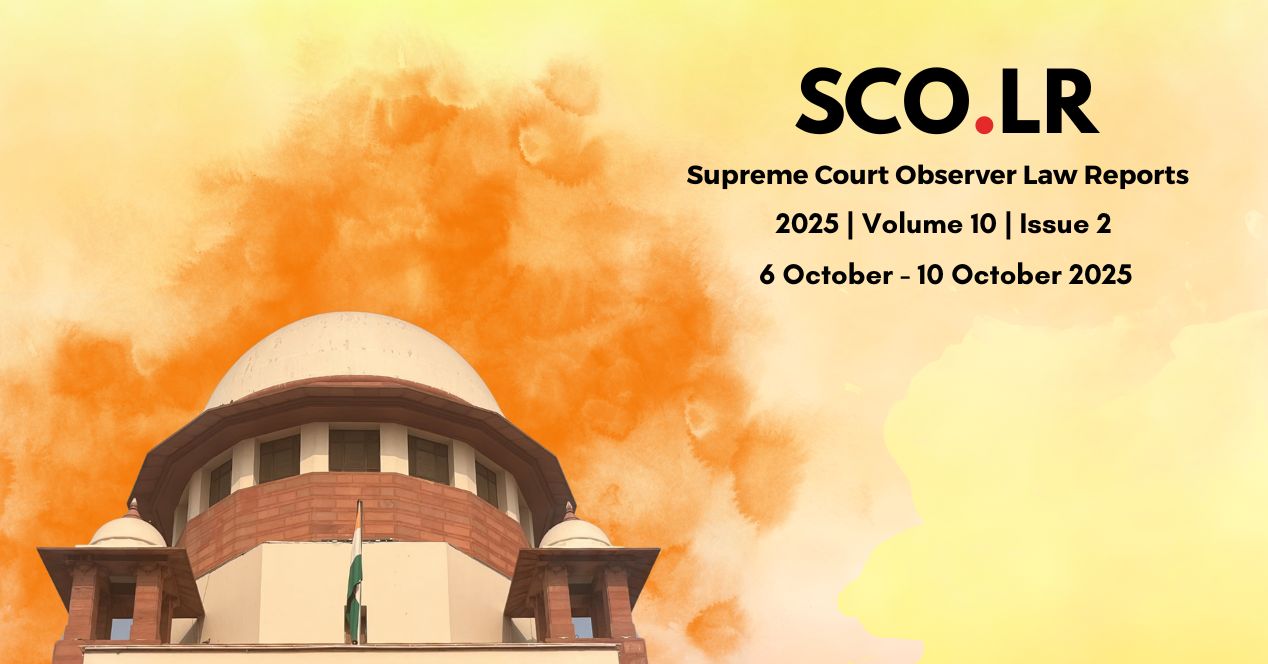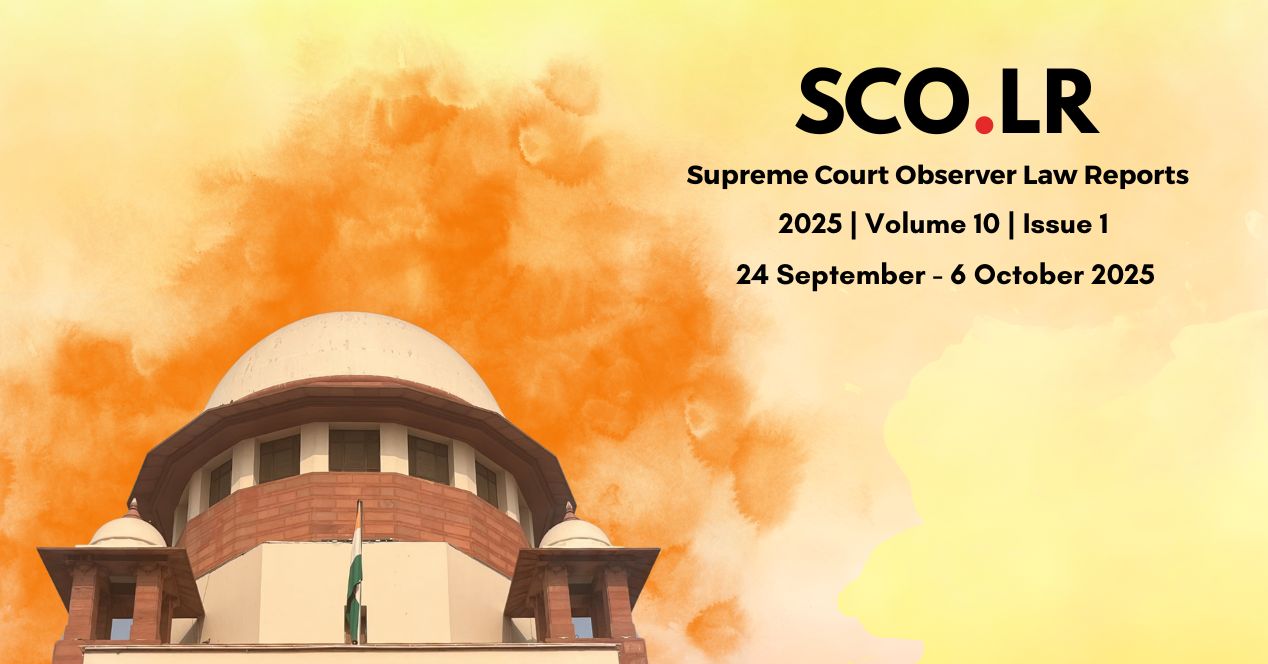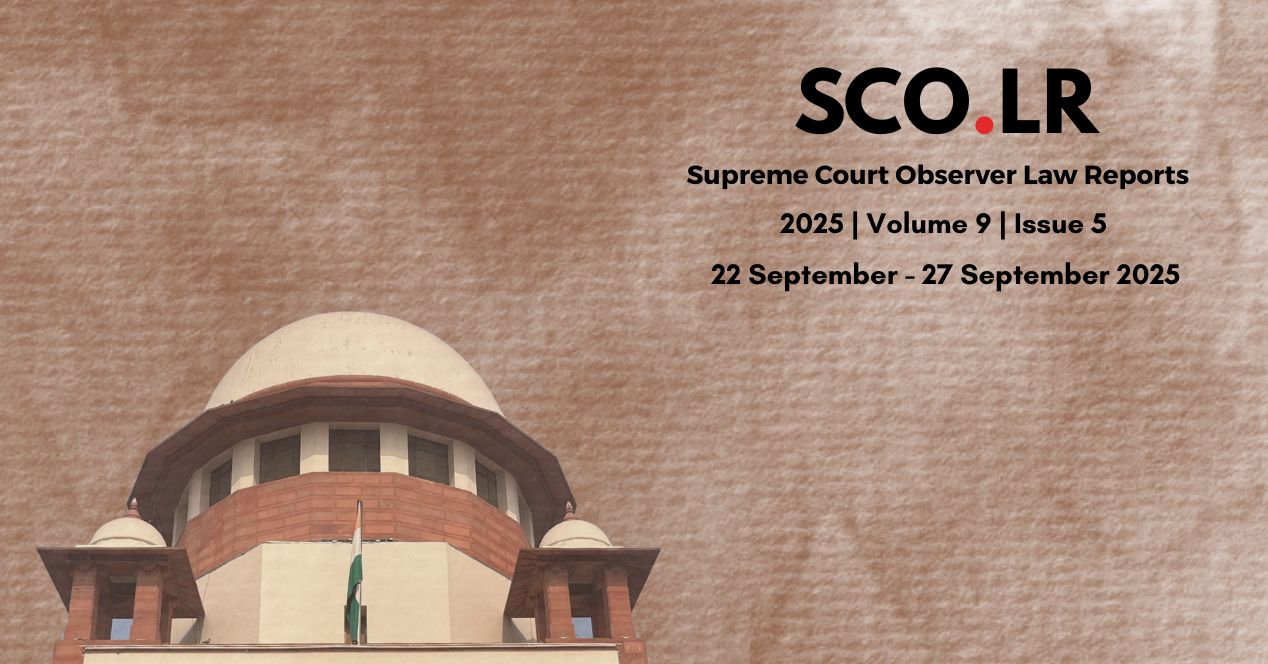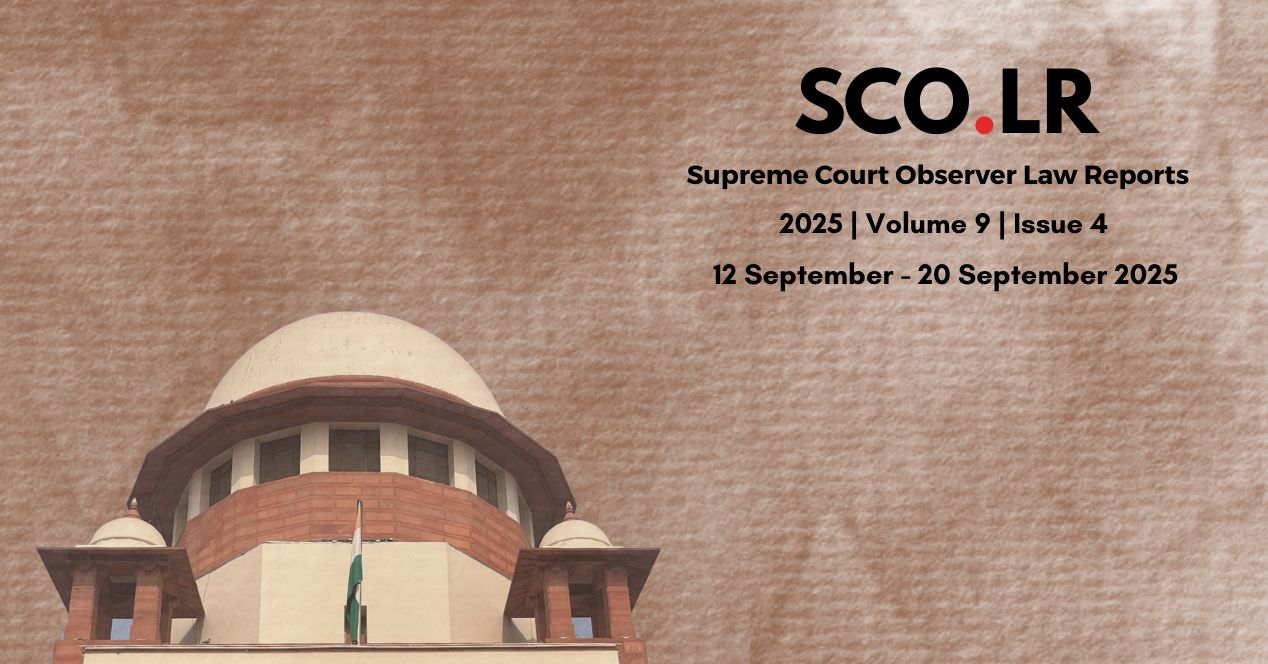Analysis
SCO.LR | 2025 | Volume 10 | Issue 3
In this Issue of SCO.LR, we bring you five important judgements from 13 October to 17 October 2025
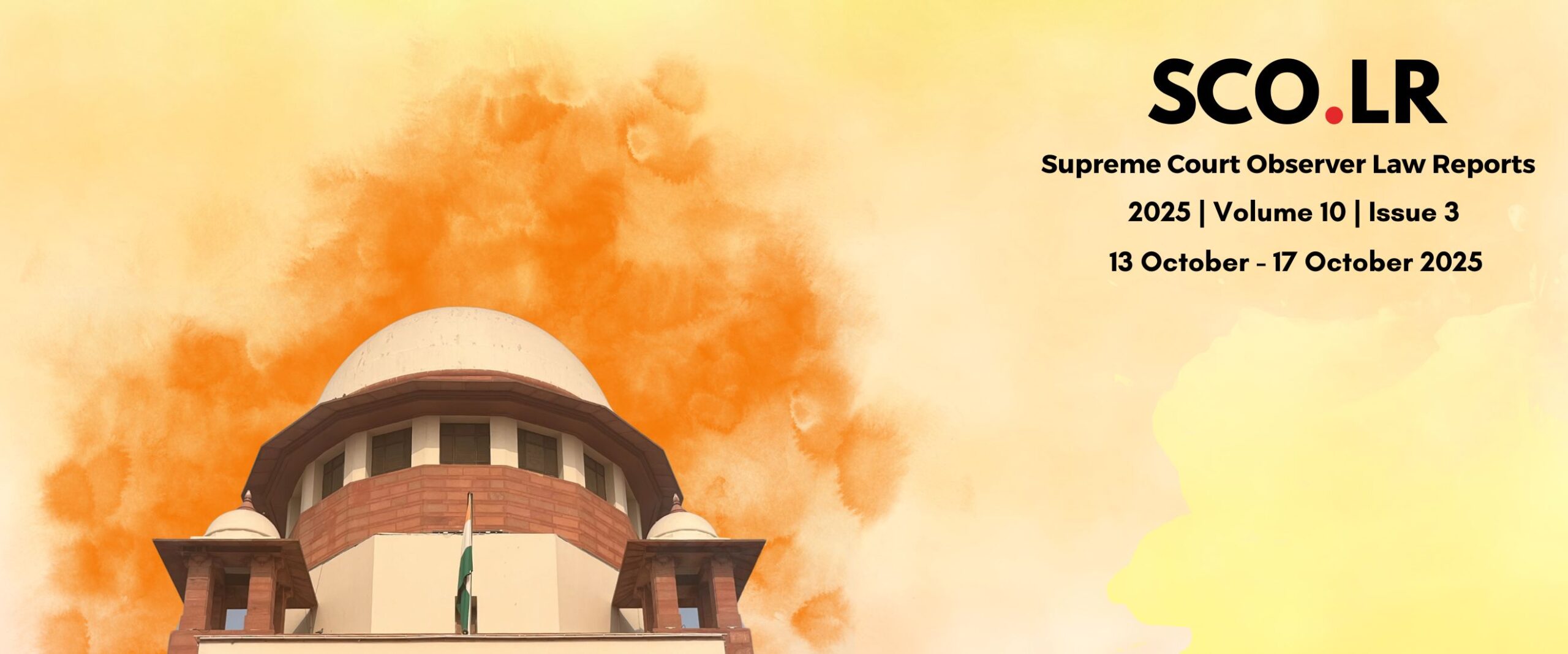
Happy Diwali! Volume 10 Issue 3 of the Supreme Court Observer Law Reports (SCO.LR) is here, featuring five important judgements pronounced by the Court just before its Diwali break.
This Issue concern cases that raise the following questions:
- Do parties that remained inactive during a litigation deserve the full benefits of a final judgement?
- Does a person’s knowledge of a victim’s caste identity matter when prosecuting a crime under the SC/ST Atrocities Act?
- What are the rights of a waitlisted candidate when a vacancy arises?
- When can a High Court order a CBI investigation, and what are the limitations on this power?
- What is the legal status of matruka property in Mohammedan law when an agreement to sell remains unexecuted?
Read the Court’s decisions on our dedicated SCO.LR page. Our mindmaps provide a quick snapshot of each judgement.
******
The Supreme Court Observer Law Reports
SCO.LR | Volume 10 | Issue 3
13 October – 18 October 2025
******
Parties Dormant during Litigation Cannot Claim Benefits Secured by Others
State of West Bengal v Santi Ceramics Pvt. Ltd.
13 October 2025
Citations: 2025 INSC 1222 | 2025 SCO.LR 10(3)[11]
Bench: Justices Surya Kant and Joymalya Bagchi
The Supreme Court refused to extend the relief granted to cultivators in Kedar Nath Yadav v State of West Bengal (2016) to a private company. Noting that Santi Ceramics falls squarely outside the protective framework of the 2016 Judgement, it added that even procedural principles exclude their claim.
Santi Ceramics had acquired 28 bighas of agricultural land in 2001-2002 and was granted approval for its conversion to industrial use in 2003. The state of West Bengal acquired the land in 2006 for an automobile factory in Singur. Santi Ceramics accepted the compensation allotted. Later, the acquisition was quashed in Kedar Nath Yadav, which was a PIL filed by farming communities. In 2016, Santi Ceramics sought restoration of the land which was accepted by the Calcutta High Court.
The Supreme Court set aside the 2018 decision of the Calcutta High Court. It noted the remedial framework of Kedar Nath Yadav was specifically to benefit disadvantaged parties whose livelihoods faced extinction; it was not general restitution to be extended to industrial entities. The Bench added that the relief was granted in personam on the basis of objections under Section 5-A of the Land Acquisition Act, 1894 and not on fundamental grounds applicable to all. It also held the acquisition to be conclusively settled due to Santi Ceramic’s own inaction, voluntary acceptance of compensation and decade of silence.
Key words/phrases: Land acquisition—Kedar Nath Yadav v State of West Bengal—in personam relief—remedial framework—procedural principles—Section 5-A, Land Acquisition Act, 1894—Singur Project—respondent inaction—distinction between cultivators and business entities.
Read the Judgement here.
**********
Knowledge of Caste Identity under the Atrocities Act
Shivkumar @ Baleshwar Yadav v State of Chhattisgarh
14 October 2025
Citations: 2025 INSC 1231 | 2025 SCO.LR 10(3)[12]
Bench: Justices B.V. Nagarathna and K.V. Viswanathan
The Supreme Court held that mere knowledge of the victim’s caste identity is sufficient to attract liability under Section 3(2)(v) of the Scheduled Castes and the Scheduled Tribes (Prevention of Atrocities) Act, 1989. Personal acquaintance with the victim raises a presumption of such knowledge.
Shivkumar was convicted by a Trial Court for sexually assaulting a minor girl belonging to a Scheduled Caste community. The incident occurred in 2017, when the victim was aged 12. Following her statement and medical examination, Shivkumar—who was her neighbour—was arrested and charged under the Indian Penal Code, 1860, Protection of Children from Sexual Offences Act, 2012 and the SC/ST Atrocities Act. The Trial Court’s sentence of life imprisonment was upheld by the Chhattisgarh High Court. In his appeal before the Supreme Court, Shivkumar contended that there was no evidence to prove he knew the victim’s caste, which was a mandatory element for conviction under Section 3(2)(v).
The Court, relying on Patan Jamal Vali v State of Andhra Pradesh (2021), clarified that post-amendment, the focus is on knowledge of caste identity rather than motive. Referring to Section 8(c) of the Atrocities Act, it held that when the accused is personally acquainted with the victim or their family, such knowledge is presumed unless rebutted. Since evidence showed that the accused frequently visited the victim’s home, the Court held that he was aware of her caste. The conviction and life sentence were affirmed.
Key words/phrases: Section 3(2)(v) of the Atrocities Act—knowledge of caste identity—statutory presumption under Section 8(c)—2016 amendment—Patan Jamal Vali precedent—High Court judgement upheld
Read the Judgement here.
**********
Appointment of Waitlisted Candidate after Expiry of Selection List
Union of India v Subit Kumar Das
15 October 2025
Citations: 2025 INSC 1235 | 2025 SCO.LR 10(3)[13]
Bench: Justices A. S. Chandurkar and P.S. Narasimha
The Supreme Court ruled that mere placement on the waitlist does not create a vested right to be appointed to a vacancy. It further noted that a waitlist operates for a limited period and cannot be extended after a fresh recruitment process has commenced.
In 1997, a candidate from the Scheduled Caste category was first on the waitlist for the post of technician at All India Radio (AIR). There were three candidates ahead of the aggrieved candidate, and all of them had been appointed. Owing to non-selection, he approached the Central Administrative Tribunal, which directed the candidate’s case to be considered based on a concession by AIR that he would be absorbed as soon as there was a vacancy against the SC quota. In June 2024, the Calcutta High Court didn’t interfere with this decision.
The Supreme Court set aside the decision of the High Court, on the ground that waitlisted candidates cannot claim appointment after the validity of the selection list has expired. The Court noted that upholding the appointment would extend the life of an expired list.
Key words/phrases: Waitlisted candidates—Scheduled Caste category—recruitment rules—no vested right of appointment—violation of Recruitment Rules—respondent not entitled to relief—High Court direction set aside.
Read the Judgement here.
**********
Power of Constitutional Courts to Order CBI Investigation
Legislative Council U.P., Lucknow v Sushil Kumar
16 October 2025
Citations: 2025 INSC 1241 | 2025 SCO.LR 10(3)[14]
Bench: Justices J.K. Maheshwari and Vijay Bishnoi
The Supreme Court held that higher courts should exercise their power of ordering a Central Bureau of Investigation (CBI) sparingly, cautiously and in exceptional situations.
Petitioners before the Allahabad High Court alleged favouritism against an external agency which conducted the examination for recruitment to various posts in the Legislative Council. After a Single Judge disposed of the petition, a Division Bench—suo moto—ordered preliminary investigation by the CBI.
The Supreme Court set aside the Division Bench’s orders for CBI’s preliminary probe, leaving it to the discretion of the Chief Justice of the High Court. The Court observed that constitutional courts must exercise some degree of judicial discretion before burdening a specialised central agency with matters that do not satisfy the threshold of an exceptional case.
Key words/phrases: High Courts power to order CBI investigation—sparingly and in exceptional circumstances—selection of under secretariat of Uttar Pradesh Legislative Council—favouritism—CBI probe based on mere doubt—requires sufficient prima facie material—High Court Judgement set aside
Read the Judgement here.
**********
Unexecuted Sales Deed Cannot Exclude Property from Matruka
16 October 2025
Citations: 2025 INSC 1245 | 2025 SCO.LR 10(3)[15]
Bench: Justices Sanjay Karol and P.K. Mishra
The Supreme Court held that an unexecuted agreement to sell cannot exclude immovable property from a “matruka”—property left behind without a will in Mohammedan law. It stated that Section 54 of the Transfer of Property Act, 1882, confers no rights nor vests any interest in another party unless an agreement to sell is executed during the owner’s lifetime.
The litigation began over property Chand Khan left behind when he died without a will. His brother, Imam Khan, argued that the property was a matruka; thus 3/4th of the property belonged to him and 1/4th to Zoharbee, the deceased’s surviving widow. Zoharbee contended that there was nothing to divide as all the property had been transferred to third parties. Notably, the agreement to sell was executed by her after Chand Khan’s death. A Civil Court ruled in her favour and held that the property was not divisible. A First Appellate Court reversed the verdict and stated that the property was matruka as the agreement to sell was not executed before his death. The Bombay High Court dismissed Zoharbee’s appeal.
The Supreme Court upheld the Order of the First Appellate Court and the High Court. It held that immovable property cannot be excluded from the division simply because an agreement exists. Accordingly, Zoharbee was entitled to transfer only her 1/4th share of the property.
Key words/phrases: Section 54—Transfer of Property Act, 1882—agreement to sell—matruka property—Mohammedan law—unexecuted sale deed cannot exclude property from matruka—appellant entitled to only transfer her share—High Court and First Appellate Court Orders upheld
Read the Judgement here.

